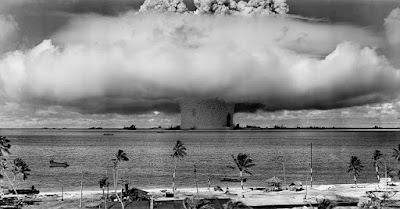Is a fission bomb the same as a hydrogen bomb?
The A-bomb equals an H-bomb?
Not at all. The natural process that triggered the first atomic bombs is contrary to the process used by the hydrogen bomb, or H-bomb.
In a conventional atomic bomb or A-bomb, energy is produced from uranium atoms. This releases some of the energy that held the atoms together. The process is called fission, which means 'split apart'.
In hydrogen bombs, on the other hand, there is another process called fusion. In a hydrogen bomb, the enormous amounts of heat cause hydrogen atoms to join together, forming helium atoms. When hydrogen atoms melt, some of their mass is changed into energy. This is the energy released by the H-bomb.
The only way scientists have found to create the necessary heat required by the fusion process in an H-bomb is to first detonate a fission bomb. So, an atomic fission bomb acts as the detonator of the even more powerful H-bomb.
The atomic bomb explodes first, producing enough heat to power the hydrogen bomb.
The bombs dropped in Japan during World War II were atomic fission bombs, but their power was minuscule compared to the nuclear bombs that exist today.
.
